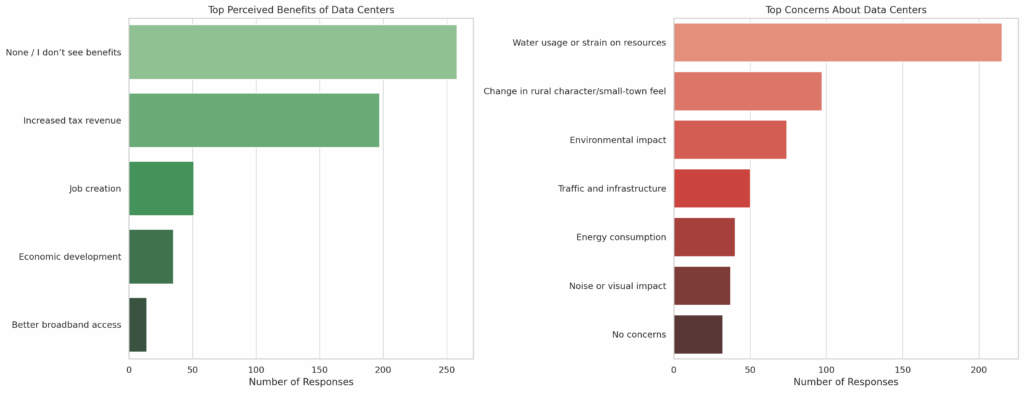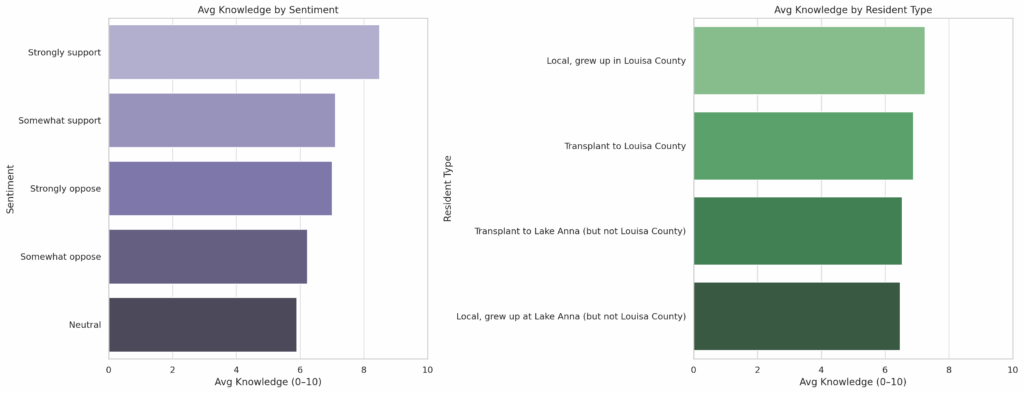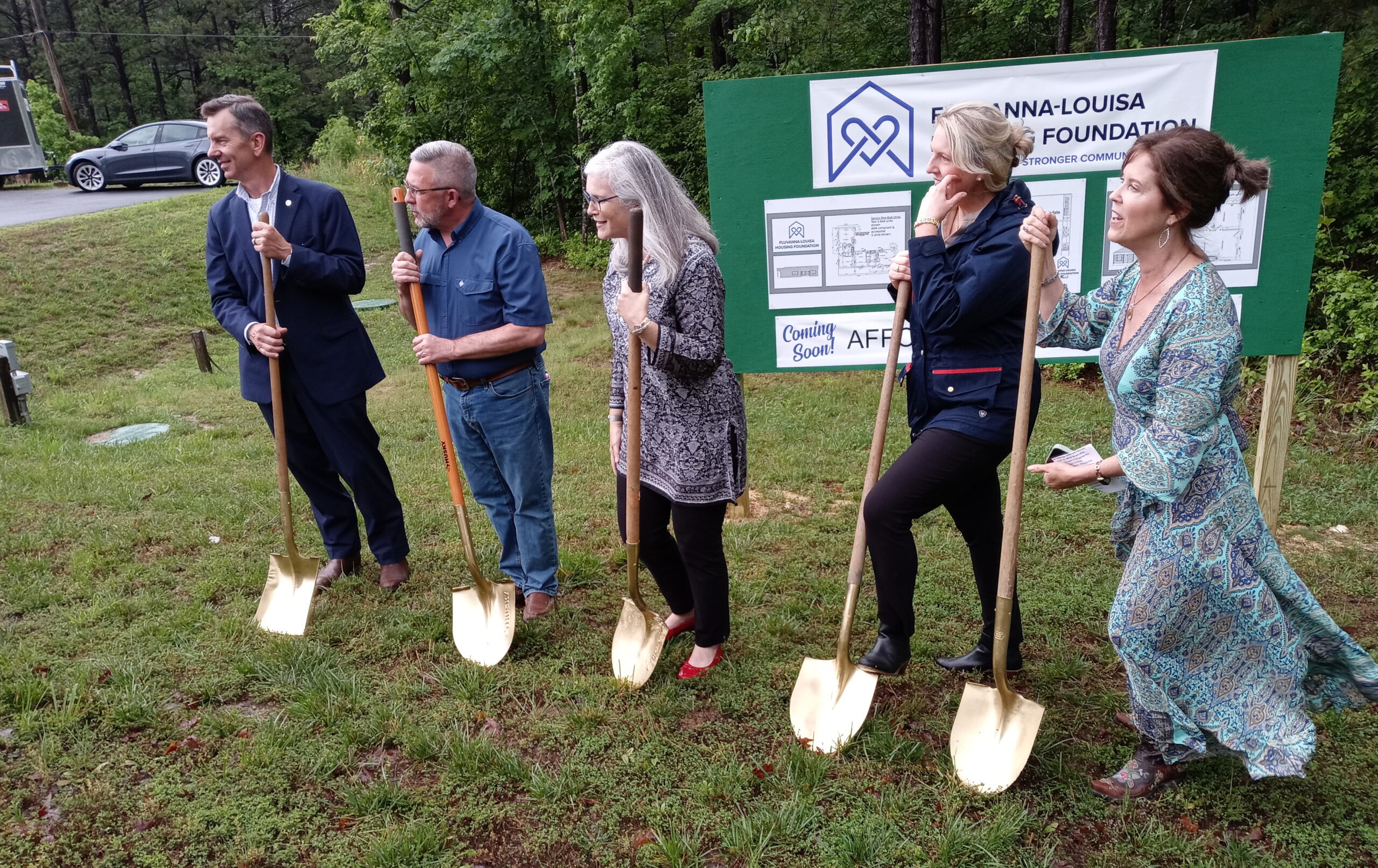![Featured image for “[Poll Results] Data Centers: Yes or No?”](https://lakeanna.online/wp-content/uploads/2025/07/output-12.png)
In July, The Breeze conducted a community survey to better understand local sentiment regarding the development of data centers in Louisa County. The survey collected 561 responses over the course of five days.
Read ‘An Editorialized Analysis’ of the Poll Results


Respondents were asked a mix of multiple-choice, scaled (0–10), and open-ended questions related to their relationship to Louisa County and Lake Anna, level of knowledge about data centers, concerns and perceived benefits, past experience (if any) living near data centers, and overall support or opposition to large-scale development in rural areas.
Notably, the survey was open to the public and promoted via social media and our email network.
The average self-reported understanding level was 7 out of 10. Concern level also averaged near 7 out of 10. In terms of support or opposition, strong opposition was the most common response across both locals and transplants. Transplants showed more division between “somewhat support” and “somewhat oppose.” Most respondents identified as either full-time residents or vacation home owners in the Lake Anna area.
Top Perceived Benefits: Increased tax revenue was seen as the most significant upside, with many residents believing data centers could help lower the tax burden on households. Job creation was also cited, with some viewing the development as an opportunity to bring skilled, high-tech employment to the area. Broader economic development, including the attraction of additional infrastructure and services, followed. A few respondents mentioned better broadband access, especially in underserved rural pockets. Nearly half of all who answered said they see no benefits at all.
Top Concerns: The leading concern was environmental impact, particularly damage to ecosystems and emissions. Water usage and strain on infrastructure were close behind, as respondents worried about power and utility capacity. Many feared that rapid development would erase the small-town, rural character of Louisa. Noise, heat, and light pollution from 24/7 operations also ranked high. Others expressed distrust toward the transparency and long-term oversight of local approvals. A smaller but notable group of respondents reported having no concerns at all.
Knowledge/ Concern by Resident Type: Locals who grew up in Louisa County had the highest self-reported knowledge level (7.3/10) and also one of the highest concern levels (8.0/10). Transplants to Louisa County followed closely, with knowledge at 6.9 and concern at 8.1 — the highest concern level overall. Transplants to Lake Anna (but not Louisa) and locals from Lake Anna (not Louisa) had slightly lower knowledge scores (around 6.4–6.6) but still leaned heavily toward strong opposition. Across all groups, the most common sentiment was “strongly oppose.”
Knowledge vs. Sentiment: Those who strongly support development reported the highest average knowledge (8.5/10). Those who strongly oppose also reported high knowledge (7.0/10), though slightly less than supporters. The lowest knowledge scores came from those who felt neutral or somewhat opposed. This suggests that both sides of the issue feel relatively well-informed — a potential sign of deep opinion divides rather than knowledge gaps.

Hi! I’m Jennifer Bailey and I partner with entrepreneurs who have massive ideas that could change the world. Most marketing is meaningless. Filled with empty promises, its only job is to bring in new traffic, new leads, and new customers. But I’ve drawn a line in the sand, and I’ve learned that marketing can do so much more than reach business goals and build profit. My methods give businesses the fire and soul they need to reach the right people, set the groundwork for sustainable relationships, and offer true value to the people on both the giving and receiving ends of marketing.
Subscribe for Updates
Sponsors
latest articles
Lake Anna Jazz Fest Returns September 6–7 With Full Weekend of Live Performances [Sponsored]
![Featured image for “Lake Anna Jazz Fest Returns September 6–7 With Full Weekend of Live Performances [Sponsored]”](https://lakeanna.online/wp-content/uploads/2025/08/515442032_768436072351719_8797996404239509411_n.jpg)
LCSO Investigates Drowning Incident in Bumpass, Virginia
Local Author’s Debut Book Becomes Bestseller, Offers Hope for Healing Dogs Without Surgery

Business Spotlight: Mike Kavros of Callie Opies Orchard [Sponsored]
![Featured image for “Business Spotlight: Mike Kavros of Callie Opies Orchard [Sponsored]”](https://lakeanna.online/wp-content/uploads/2024/07/MikeKavros232Final.jpg)
Why Lake Anna Sunsets Are Ideal for Wedding Photography

Crafting the Ultimate Lakeside Wedding: A Dream Timeline for Your Lake Anna Celebration

In July, The Breeze conducted a community survey to better understand local sentiment regarding the development of data centers in Louisa County. The survey collected 561 responses over the course of five days.
Read ‘An Editorialized Analysis’ of the Poll Results


Respondents were asked a mix of multiple-choice, scaled (0–10), and open-ended questions related to their relationship to Louisa County and Lake Anna, level of knowledge about data centers, concerns and perceived benefits, past experience (if any) living near data centers, and overall support or opposition to large-scale development in rural areas.
Notably, the survey was open to the public and promoted via social media and our email network.
The average self-reported understanding level was 7 out of 10. Concern level also averaged near 7 out of 10. In terms of support or opposition, strong opposition was the most common response across both locals and transplants. Transplants showed more division between “somewhat support” and “somewhat oppose.” Most respondents identified as either full-time residents or vacation home owners in the Lake Anna area.
Top Perceived Benefits: Increased tax revenue was seen as the most significant upside, with many residents believing data centers could help lower the tax burden on households. Job creation was also cited, with some viewing the development as an opportunity to bring skilled, high-tech employment to the area. Broader economic development, including the attraction of additional infrastructure and services, followed. A few respondents mentioned better broadband access, especially in underserved rural pockets. Nearly half of all who answered said they see no benefits at all.
Top Concerns: The leading concern was environmental impact, particularly damage to ecosystems and emissions. Water usage and strain on infrastructure were close behind, as respondents worried about power and utility capacity. Many feared that rapid development would erase the small-town, rural character of Louisa. Noise, heat, and light pollution from 24/7 operations also ranked high. Others expressed distrust toward the transparency and long-term oversight of local approvals. A smaller but notable group of respondents reported having no concerns at all.
Knowledge/ Concern by Resident Type: Locals who grew up in Louisa County had the highest self-reported knowledge level (7.3/10) and also one of the highest concern levels (8.0/10). Transplants to Louisa County followed closely, with knowledge at 6.9 and concern at 8.1 — the highest concern level overall. Transplants to Lake Anna (but not Louisa) and locals from Lake Anna (not Louisa) had slightly lower knowledge scores (around 6.4–6.6) but still leaned heavily toward strong opposition. Across all groups, the most common sentiment was “strongly oppose.”
Knowledge vs. Sentiment: Those who strongly support development reported the highest average knowledge (8.5/10). Those who strongly oppose also reported high knowledge (7.0/10), though slightly less than supporters. The lowest knowledge scores came from those who felt neutral or somewhat opposed. This suggests that both sides of the issue feel relatively well-informed — a potential sign of deep opinion divides rather than knowledge gaps.

Hi! I’m Jennifer Bailey and I partner with entrepreneurs who have massive ideas that could change the world. Most marketing is meaningless. Filled with empty promises, its only job is to bring in new traffic, new leads, and new customers. But I’ve drawn a line in the sand, and I’ve learned that marketing can do so much more than reach business goals and build profit. My methods give businesses the fire and soul they need to reach the right people, set the groundwork for sustainable relationships, and offer true value to the people on both the giving and receiving ends of marketing.
Subscribe for Updates
Sponsors
latest articles
Lake Anna Jazz Fest Returns September 6–7 With Full Weekend of Live Performances [Sponsored]
![Featured image for “Lake Anna Jazz Fest Returns September 6–7 With Full Weekend of Live Performances [Sponsored]”](https://lakeanna.online/wp-content/uploads/2025/08/515442032_768436072351719_8797996404239509411_n.jpg)
LCSO Investigates Drowning Incident in Bumpass, Virginia
Local Author’s Debut Book Becomes Bestseller, Offers Hope for Healing Dogs Without Surgery

Business Spotlight: Mike Kavros of Callie Opies Orchard [Sponsored]
![Featured image for “Business Spotlight: Mike Kavros of Callie Opies Orchard [Sponsored]”](https://lakeanna.online/wp-content/uploads/2024/07/MikeKavros232Final.jpg)
Why Lake Anna Sunsets Are Ideal for Wedding Photography

Crafting the Ultimate Lakeside Wedding: A Dream Timeline for Your Lake Anna Celebration


Belmont Ruritan Clubs Award $26,000 in Scholarships to Local Seniors
Article By Jen Bailey

Exclusive Golf Excursions for Cutalong Members
Article By Jen Bailey








